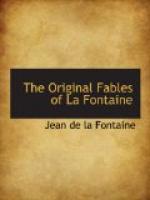Open such a machine and examine it; what do we find? Wheels take the place of intelligence. The first wheel moves the second, and that in turn moves a third, with the result that, in due time, it strikes the hour.
According to these new philosophers, that is exactly the case with an animal. It receives a blow in a certain spot, this spot conveys the sensation to another spot, and so the message goes on from place to place until the brain receives it and the impression is made. That is all very well, but how is the impression made?
It is necessarily made, without passion, without will, say these philosophers. They tell us that the common idea is that an animal is actuated by emotions which we know as sorrow, joy, love, pleasure, pain, cruelty, or some other of these states; but that it is not so. Do not deceive yourself, they say.
“What is it then?” I ask. A watch, indeed! And pray what of ourselves?
Ah, well! that is perhaps another thing altogether. This is the way Descartes expounds the theory—Descartes, that mortal who, if he had lived in pagan times, would have been made a god, and who holds a place between man and the higher spirits, just as some I could name—beasts of burden with long ears—hold a place between man and the oysters. Thus, I say, reasons this author: “I have a gift beyond any possessed by others of God’s creatures, and that is the gift of thought. I know of what I think.”
But from positive science we know that although animals may think, they cannot reflect upon what they think. Descartes goes further and boldly states that they do not think at all. That is a statement which need not worry us.
Nevertheless, when in the woods the blast of a horn and the baying of hounds agitates the fleeing quarry; when he vainly endeavours, with all his skill, to confuse and muddle the scent which betrays him to his pursuers; when, an aged beast with full-grown antlers, he puts in his place a younger stag and forces it to carry on the chase with its fresher bait of the scent of its younger body, and thus carry off the hounds and preserve his days—then surely this beast has reasoned. All the twisting and turning, all the malice, deception, and the hundred stratagems to save his life are worthy of the greatest chiefs of war; and worthy of a better fate than death by being torn to pieces; for that is the supreme honour of the stag.
Again; when the partridge sees its young in danger, before their wings have strength enough to bear them away from death, she makes a pretence of being wounded and flutters along with a trailing wing, enticing the huntsman and his dogs to follow her, and thus by turning away the danger saves her little ones. And when the huntsman believes that his dog has seized her, lo! she rises, laughs at the sportsman, wishes him farewell, and leaves him confused and watching her flight with his eyes.




